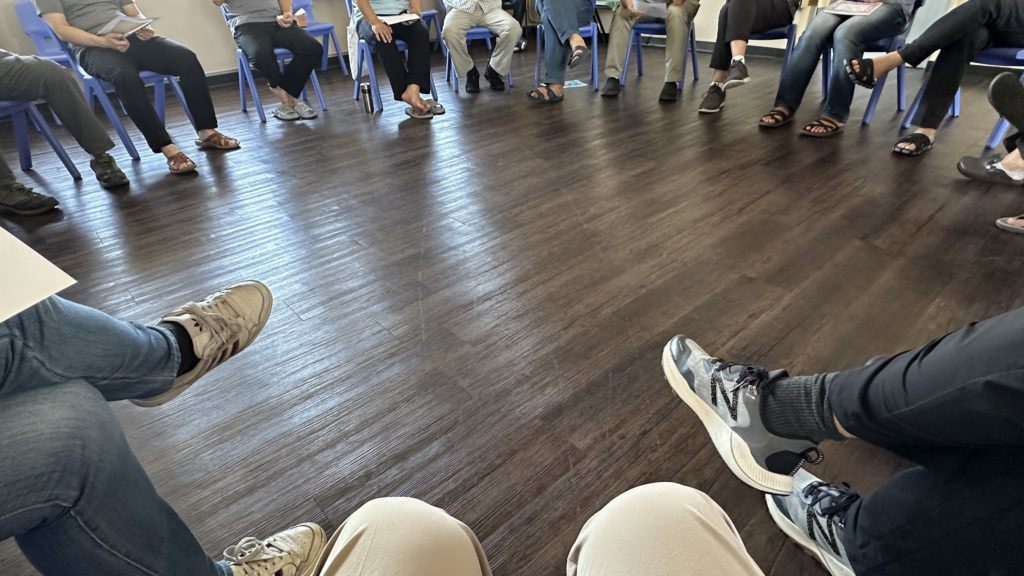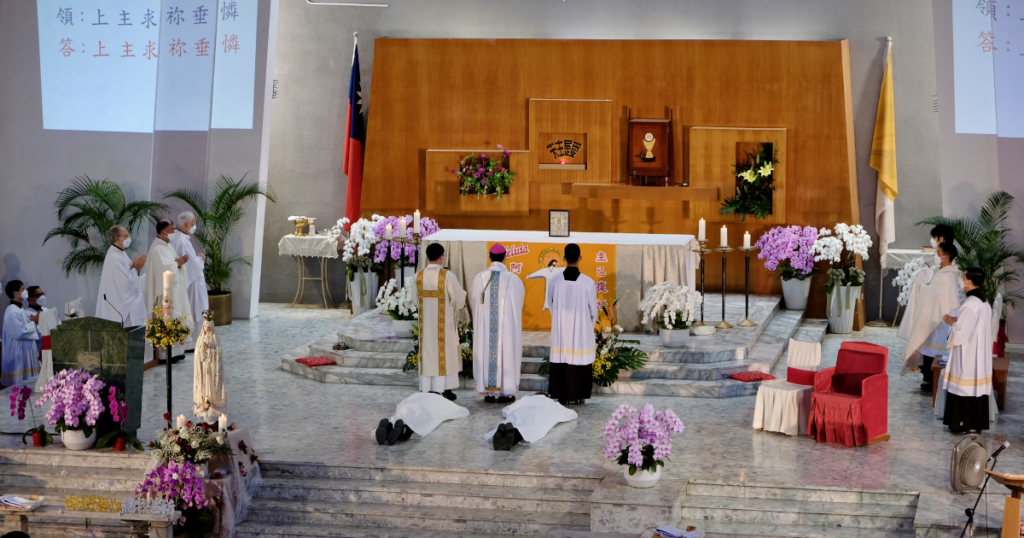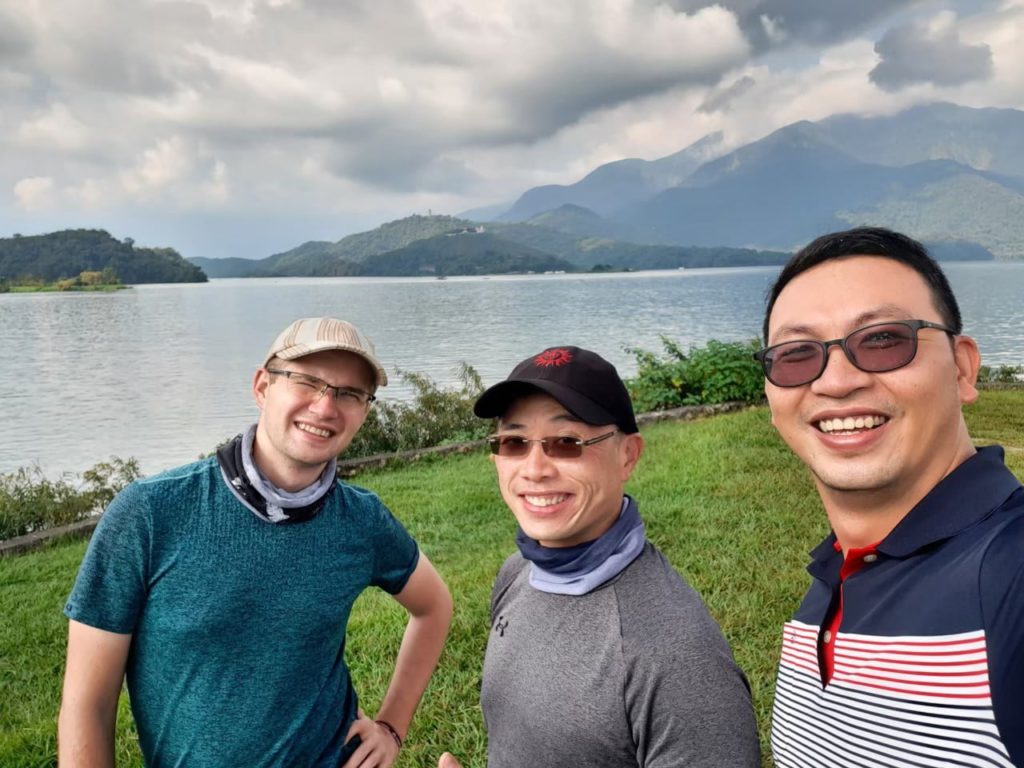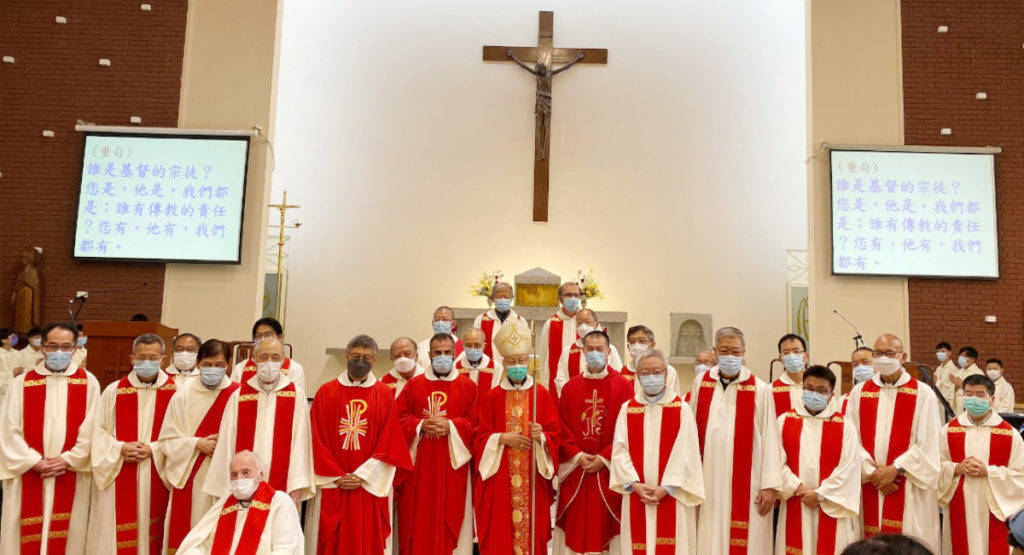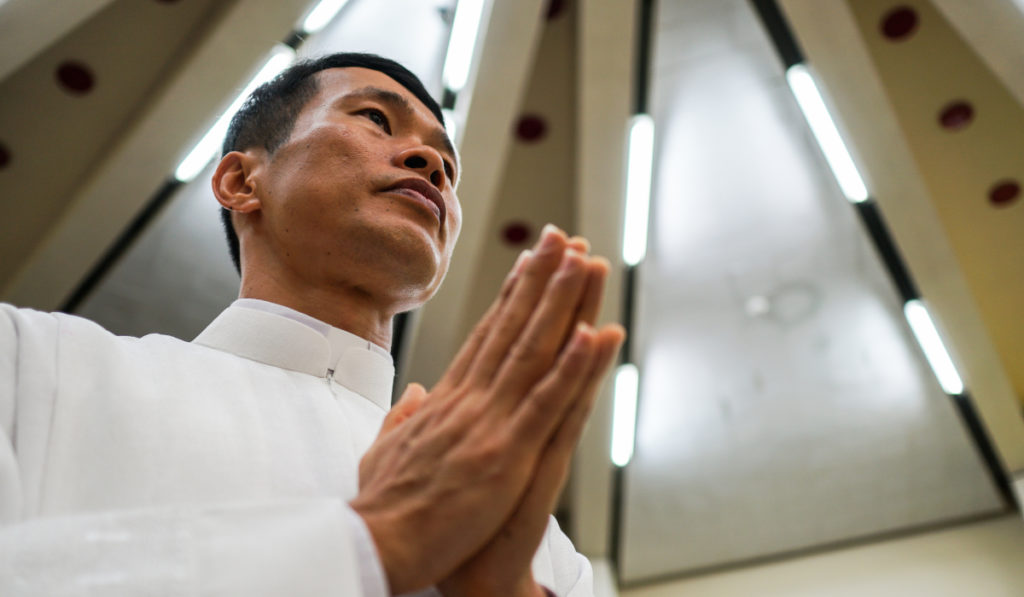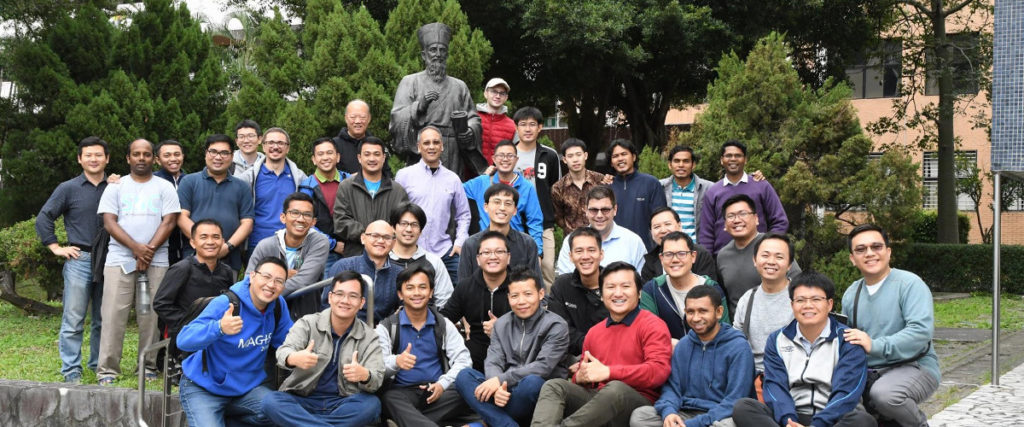As the pandemic situation eased and border controls relaxed, nearly 20 young Jesuit priests who are in apostolic ministries of the Chinese Province met on the eve of the Mid-Autumn Festival at the beautiful and serene Xavier House in Hong Kong, where they spent time in a spirit of communion while participating in a five-day workshop Continue reading “Young priests gathering of the Chinese Province: Sharing and discerning in deep brotherly friendship”
Young priests gathering of the Chinese Province: Sharing and discerning in deep brotherly friendship
Deacons in the service of the Church
The Chinese Province of the Society of Jesus celebrated the ordination to the diaconate of two scholastics, Philip Fung Hon-chung SJ and Przemyslaw Mąk SJ, on 7 May at the Holy Family Church in Taipei. Due to the Covid-19 pandemic, the organising committee offered two options for people to participate in the liturgical celebration: in-person or through the livestream. Despite the challenges, the faithful, friends, and classmates of the two ordinands filled the church with enthusiasm.
The Archbishop of Taipei, Most Rev Thomas Chung, was initially scheduled to preside at the ordination. However, due to recent cases of infection at the Taipei Archdiocesan chancery office, Most Rev John Baptist Lee, the Bishop of Hsinchu Diocese and chairperson of the Chinese Regional Bishops’ Conference, presided over the liturgy instead. The Mass was also joined by more than 30 concelebrants.
Bishop Lee exhorted the two ordinands to immerse themselves in works of charity, deepen their spiritual life, and be fervent in evangelization. Later, two Jesuit priests, Fr Jaime Valenciano and Fr Barry Martinson vested the new deacons respectively with the stole and dalmatic.
Towards the end of the liturgy, the Socius of the Chinese Province, Fr Luciano Morra SJ, gave the thanksgiving speech on behalf of the Provincial, Fr Stephen Tong SJ, who is currently in Hong Kong and so was unable to attend the celebration due to travel restrictions from the pandemic. Fr Morra read Father Provincial’s letter in which he specifically thanked the Bishop for ordaining our two Jesuit brothers to the diaconate as servants of the Church.
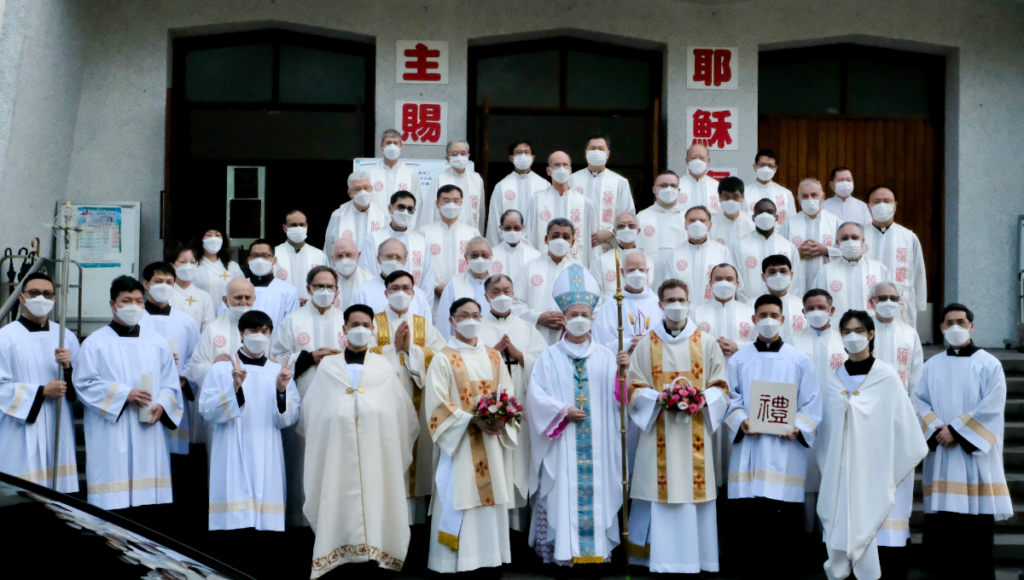
In his letter, Fr Tong also mentioned the varied backgrounds of the new deacons: Philip is a neurologist while Przemyslaw is a ballroom dancer, yet the same Lord called them both and placed them together. This shows forth the diverse and international character of the Society of Jesus. Father Provincial sincerely hopes that the new deacons will reflect the image of God indefatigably in all circumstances.
Fr Tong also described the role and essence of deacons in the early Church. He encouraged the new deacons to concretely embody the spirit of Jesus expressed in his words: “I did not come to be served, but to serve,” He further exhorted them to live out the motto of the Jesuits: “For the Greater Glory of God” standing firmly on the foundation of the Holy Church.
Finally, Fr Tong expressed his gratitude for the generosity of the parents of the deacons. He hopes the two deacons will grow joyfully in their vocation.
At the end of liturgy, the new deacons gave thanksgiving speeches, each in their mother tongue, Cantonese and Polish, respectively. They expressed gratitude for the support of family and friends. Since this ordination day was also the Feast of Our Lady of China, the two deacons venerated the Holy Mother with a bouquet of flowers while singing and dancing to the Magnificat. In so doing they drew this heartwarming celebration to a perfect end.
Finding God in the midst of hard work
The Arrupe Month is a time of grace for Jesuit scholastics. In addition to the eight-day retreat, participants have the opportunity to meet different people and listen to their vocation stories, to discuss a wide range of topics, from Ignatian Spirituality to the issues of the Church, from the longing of the faithful to the experience of waiting for a mission. This rich exchange is very helpful for scholastics in reflecting on our vocation. They help us to pray and go deeper into our own spiritual experiences.
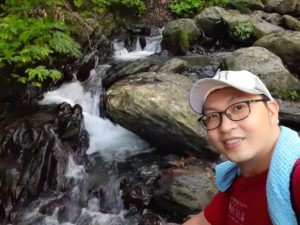 In the evenings, we take turns sharing our vocation stories through prayer and reflection. This brought me a greater sense of understanding and sympathy. It also gave me the opportunity to know myself better and reflect on how God has led me to consecrated life these last 10 years.
In the evenings, we take turns sharing our vocation stories through prayer and reflection. This brought me a greater sense of understanding and sympathy. It also gave me the opportunity to know myself better and reflect on how God has led me to consecrated life these last 10 years.
Ten years is not a short time and a lot has happened, but if I had to describe it in one phrase, it would be: Finding God in the midst of hard work.
My Provincial Superior once asked me: “Where is the easiest situation for you to find God?”
At that time, I answered: “In serving the poor and the suffering.”
This answer is real because I have felt Him through serving lepers and the mentally ill, and I have learned a lot from the poor and those in need, who have not only influenced me to know myself, but have also given me the opportunity to experience God’s love.
God’s teachings and companionship flow abundantly, and I feel God’s greatness and generosity if I open my heart and mind to be in union with Him. He continues to lead me to different people and experiences to make me realise that in the midst of suffering, sickness, and hardship, God is closer to the people. There is no need to fear or run away because we can rely on God’s strength to face and find meaning in difficulties.
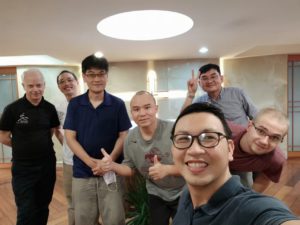 During the Arrupe Month I had time to slowly reflect on my difficult experiences, and I was filled with many wonderful feelings. In particular, these few experiences stand out.
During the Arrupe Month I had time to slowly reflect on my difficult experiences, and I was filled with many wonderful feelings. In particular, these few experiences stand out.
I once worked in a cement factory. I was assigned in different departments, but what I remember most is the time I spent in the basement doing packaging work, standing for eight hours a day. It was really challenging for me. I lost four to five kilograms, but it was a most rewarding moment when I felt the presence of God. Working in an environment where I could not get enough food, clothing, and water was the closest I felt to God.
I also spent time in a psychiatric centre helping care for about 200 patients. I was physically and mentally stretched to my limit, but it was there that I saw God’s miracles in the life of my patients.
Currently I am studying theology, and there are many hard parts in being a student. From my experience, it seems that the more demanding a teacher is and the more challenging the exams are, the more fruitful the class becomes.
In Taiwan, I often hear the phrase “you’ve worked hard” to encourage and comfort others, which is a good habit. For me though, this phrase has taken on a different meaning, that is, “the opportunity to be with God”. I consider it a blessing that gives me much strength to face difficult and hard things.
Scholastic Peter Phạm Khánh Linh SJ from Vietnam is a third year theology student at the Fu Jen Faculty of Theology of St Robert Bellarmine in New Taipei City, Taiwan. The Arrupe Month is a period of reflection and discussion that prepares Jesuit scholastics for ordination.
Vietnamese Jesuit ordained deacon in Taiwan
Michael Nguyen Phuoc Bao Dai Loi SJ from Vietnam was ordained to the diaconate in the chapel of the Fu Jen Faculty of Theology of St Robert Bellarmine in New Taipei City on 21 August. The Most Rev Thomas An-Zu Chung, Archbishop of Taipei, was the ordaining prelate.
Deacon Loi, 38, was born in Hue in central Vietnam. Before entering the Society of Jesus in 2008, he studied sociology at Ho Chi Minh City University of Social Sciences and Humanities. He was sent to Taiwan for his Regency and later for theology studies at St Robert Bellarmine School of Theology.
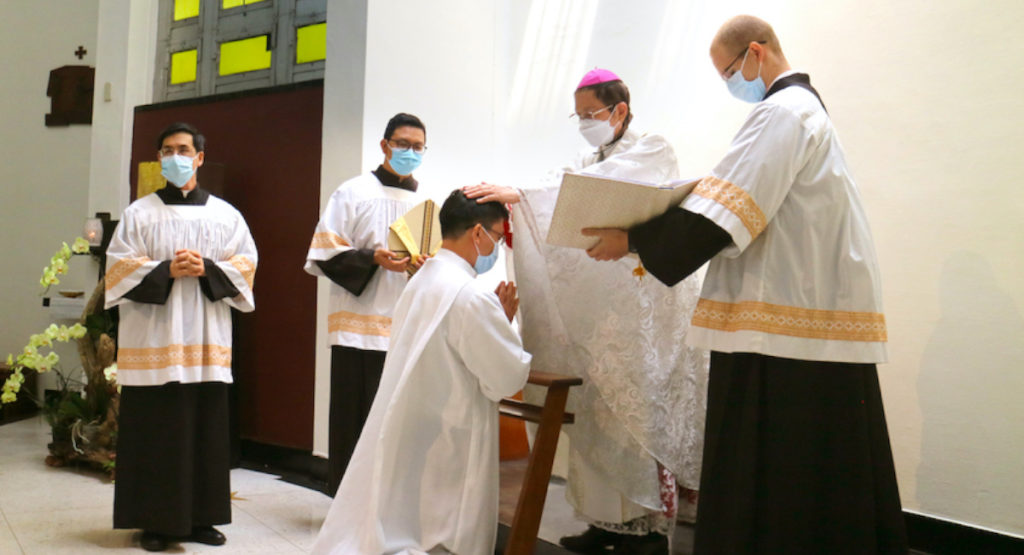
Some little thoughts
I am to be ordained tomorrow. It is now 22:19, 13 August 2021. After finishing the first rehearsal with all the greatest altar boys of Wah Yan College Hong Kong and Wah Yan College Kowloon, I received one WhatsApp message from a friend in Rome. The message read: “Congratulations Fr Philip! We offered a Mass for your ordination today!” I laughed in my room not because my friend was confused about the date and time of my ordination, but because the message was the only “other kind” I had received throughout the entire day; the others had all been about the logistics and revisions of the logistics of the ordination. I feel extraordinarily grateful for this message: It is not an error, but a blessing because it reminds me that I have friends from all over the world!
A year ago, when I was just ordained as a deacon and missioned to study Canon Law in Rome, I could not foresee the highs and lows of the year. I thought, well, it would be difficult, but I would never have thought it would be so “different”.
It was different in many senses. For example, language was different. I had to pass an exam in Italian before I could register in the school, and I had only three months to improve from level zero to level B1. The community was different. We spoke only Italian during breakfast and lunch – even when sometimes during breakfast I was not yet fully awake. The class was different; the professors started from the Codes written in Latin and tried to explain them in Italian.
Thank God for a great Italian teacher, who is also a good friend of the Jesuits in Rome. She treated me more like her son instead of her student. This is not an exaggeration, because later, when I got sick with Covid, she sent me a huge box of famous Italian handmade chocolates (that I would never have dared to use my allowance to buy). Though I had eaten all of them, I still have the box. And when I see the box, from time to time, it makes me want to cry.
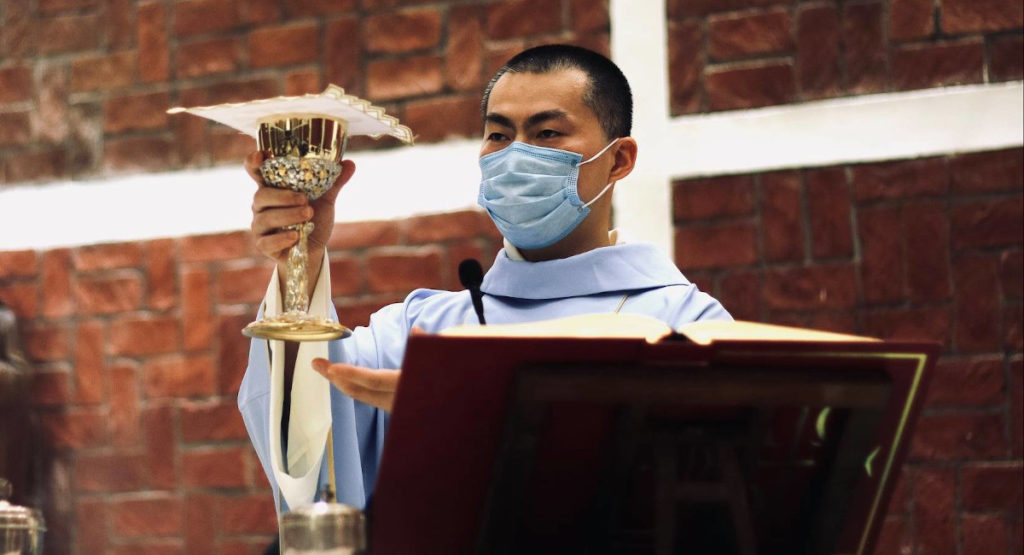
Also, I had great professors. I will not name them because they are very truly Jesuit professors. For example, Fr G has a strong Spanish accent even when speaking Italian. At first, I worried because I knew neither Italian nor Spanish, but one time he gave me a whole extra hour so that I could ask my questions and finally finish a deadly assignment. From him, I learned more than knowledge. Besides, we also had Fr R, who gave perfect notes and checked every lesson in our study, from the correct pronunciation of a Latin word to the right understanding of each Canon Code. He was always full of courage after commenting on many codes. He would say, “According to me, this code is USELESS!” It may seem like a sarcastic joke, but he was showing us real “critical thinking”.
Moreover, I had best friends. When my PCR test came back “positive”, my mind blanked out momentarily. Then I took a breath, collected the things I would need, and moved to the room for quarantine. It was not a bad room – in fact, it was on the first floor with a window that opened to the “cortile” (courtyard) of Bellarmino. On the second day many came to visit. They would stand in the cortile, and I would appear in the window. A little whim came to me, so I started to bless them by making the sign, which made all of us laugh. I guess you must laugh, too, if you can imagine because I just made myself like the Pope, who would bless the pilgrims from his window.
Thus, I did not find a big space for me to grieve or to be sad because I got sick. Fr Provincial sent me a message of encouragement, telling me to “be courageous because you are now part of the millions who are also suffering”. I thought: “That’s right. To be a Jesuit is not like having a magic shield that can protect us from the struggles of all others.” So I wrote him a letter in which I included all the names of those who had treated me so well since I arrived in Rome. Interestingly, as I was writing this letter, my fear and worry slowly faded away. I guess that’s what Fr George Yeung, Fr Mon Bautista, and Fr Chris Dumadag (my novice masters) taught me about gratitude: It defines our lives in front of God, and it can change everything. In fact, since I now have the natural antibodies, I was able to take care of friends in the community who also got sick with Covid afterwards.
I am grateful for the whole year. I am to be a priest and a servant of God for life. I am happy to have reached this point because I am not alone; I am well accompanied by so many even though I am an only child. My parents are well taken care of by my friends in my hometown, though we could only communicate by WeChat, and it has not been easy for me to visit them often. I think this is the most beautiful part of my vocation, that I am here to offer my life to God, and yet He is actually the one who is preparing something greater for me.
And how to cooperate with God? I don’t know how to summarise this in one phrase, since for me, God is becoming more and more like a funny companion. He knows that I need some challenges to grow out of my fear and tendency for “controlling” situations. So I got malaria in Africa, Dengue fever in Cagayan de Oro, and Covid in Rome. (I hope the list will not grow anymore, but let’s see.) Yet, every time, He left me with a braver heart. God is my great friend.
As I end this reflection, my personal reflection continues. I remember Fr Mon who told me before my First Vows in the Novitiate to be “gentle and firm”. Now I think God is making me like that, bit by bit, with His “gentle and firm” hand leading me on.
“For God all things are possible”
Fr Clement Tsui SJ pronounced his Final Vows on 31 July at the school chapel of Wah Yan College, Hong Kong, in front of Chinese Jesuit Provincial Fr Stephen Chow SJ, and members of the Jesuit community in Hong Kong.
A native of Hong Kong, Fr Tsui entered the Society of Jesus in 2005, after working in the banking industry. He was ordained a priest in 2015. At his Final Vows, he recalled the inspiration he received from the Lord when he was discerning his vocation to join the Jesuits. It was a passage from the Gospel of Mark: “For human beings it is impossible, but not for God; for God, all things are possible” (Mk 10:27).
Now 16 years later, on the feast day of St Ignatius of Loyola, he shared: “I felt consoled when I professed my Final Vows. It was a blessing for me and my community in Hong Kong.”
Apart from his family and friends, Fr Tsui also invited a group of young men to participate in the Mass. “I hope to be an empathic role model for them,” he said, “so more young men may consider joining the Society of Jesus.”
Fr Tsui is currently the School Chaplain of Wah Yan College Hong Kong and the Chairman of the Education Commission of the Chinese Jesuit Province. He is also the Assistant for Youth Ministry in Hong Kong. His latest mission is as Supervisor of Wah Yan College, Hong Kong and Wah Yan College, Kowloon, succeeding Fr Chow beginning September this year.
Fostering growth in affective maturity
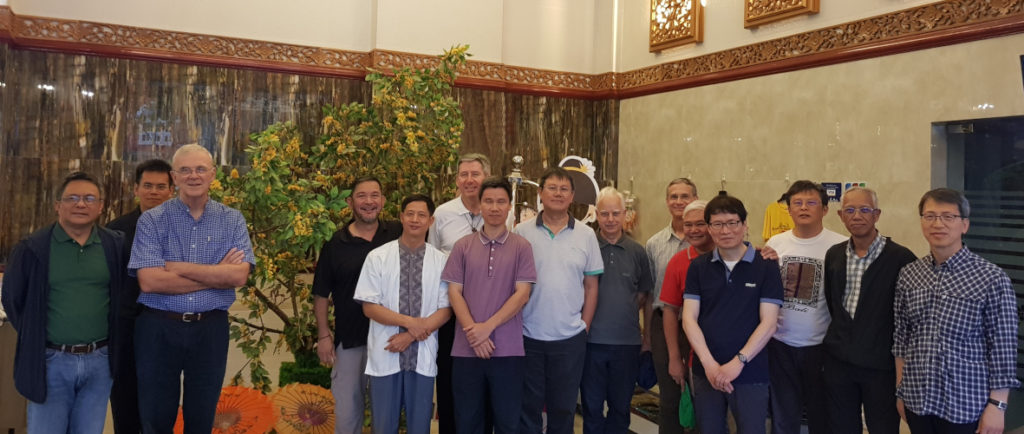 A solid human formation is foundational to every Jesuit. The recent gathering of formation delegates of the Jesuit Conference of Asia Pacific (JCAP) focussed on how to help Jesuits in formation to grow in affective maturity and celibacy.
A solid human formation is foundational to every Jesuit. The recent gathering of formation delegates of the Jesuit Conference of Asia Pacific (JCAP) focussed on how to help Jesuits in formation to grow in affective maturity and celibacy.
This year’s meeting held from June 17 to 20 in Yangon, Myanmar followed through last year’s topic on “Safeguarding the Minor”. Fr James Gascon SJ, psychoanalyst, counsellor and former director of the Center for Family Ministries in the Philippines, guided discussions on motives for living a celibate life, the theological dimensions of celibacy and sexual identity, sexual maturity and integration, boundaries, and accompaniment of homosexuals in formation.
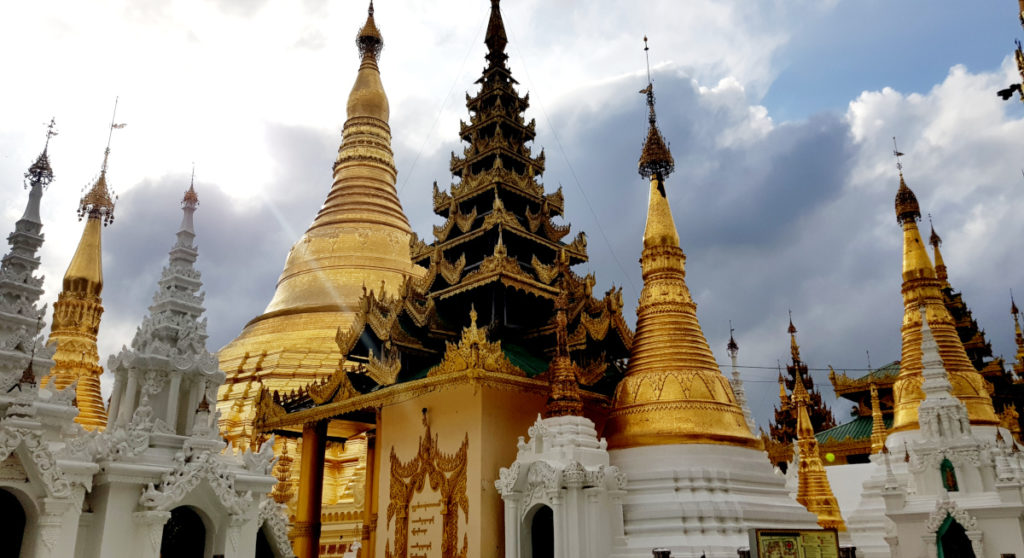
Although the sessions were loaded and intense, the delegates appreciated the serious study and presentations, particularly in naming, identifying and clarifying issues related to celibate chastity, sexuality and sexual identity in relation to Jesuit formation. These subjects are often difficult to talk about in an Asian context, where in many places they are considered sensitive and taboo. The presentations were, in fact, mostly based on a Western context, as Fr Gascon admits, because of the dearth of research in the Asian context. The invitation after the sessions was always for us to reflect on how the inputs made sense in our work of formation in our own provinces and regions.
Besides the presence of JCAP Formation Delegate Fr Riyo Mursanto SJ and JCAP Delegate for Studies Fr Robin Koning SJ, we were graced by the participation of Fr Mark Ravizza SJ, General Counsellor for Formation. He shared about formation vis-à-vis the new Universal Apostolic Preferences (UAPs) of the Society. Fr Ravizza emphasised understanding the preferences as “orientations” and not simply as priorities, thus, considering the UAPs as a “spiritual path” – “a dynamic means for continuing to be guided by the Spirit”, a new way of proceeding, a process of discernment.
The UAPs are given to us as “a guide to the renewal of life and mission that General Congregation 36 sought, to respond to who we want to be and how we are called to live”, said Fr Ravizza. They invite “each person, community and institution to enter into a process of discernment to hear and respond to the cries of the poor, the youth and the earth in their local context”. Therefore, the UAPs are an invitation to a “conversion that empowers the mission”. In this understanding, Fr Ravizza reminded us how the Spiritual Exercises, spiritual conversation and discernment in common are important tools that help us “to show the way to God”.
After three days of earnest discussions, we visited Campion Institute, the English language school, and the newly opened Myanmar Leadership Institute in Yangon to gain a better appreciation of the Society’s work in Myanmar. A visit to the country would be incomplete without stopping by the 2,500-year-old Shwedagon Pagoda, a magnificent Buddhist temple about 110 metres high, covered with gold plates and a stupa encrusted with over 4,000 diamonds. We ended the meeting with a prayer for the country and for the Jesuit Mission in Myanmar.
Diaconate ordination in Taiwan
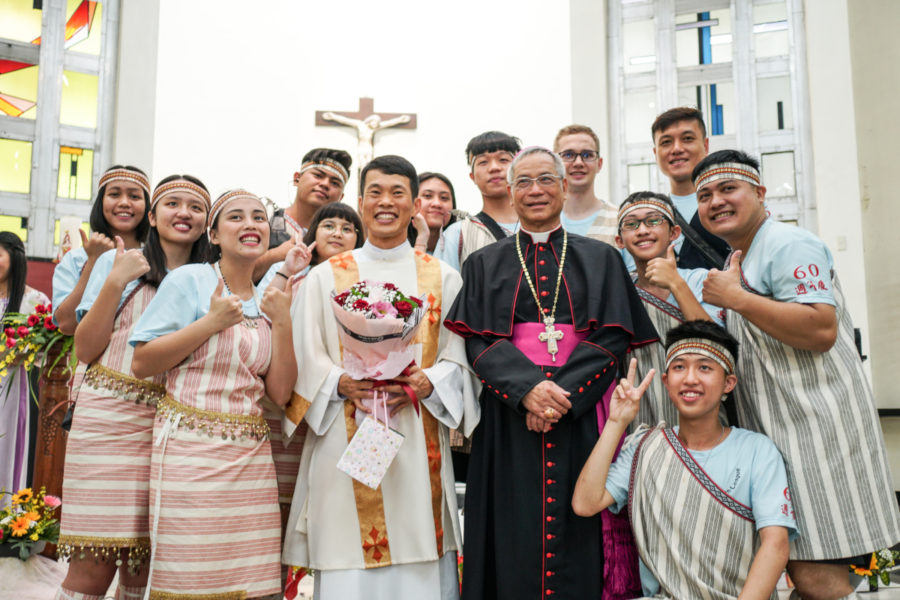 Family, friends and members of religious communities gathered on the bright morning of June 8 to witness the diaconate ordination of Joseph Dang Do Nhan SJ by Most Rev John B Shan-Chuan Hung SVD, Archbishop of Taipei. The Mass was held at St Robert Bellarmine Chapel of Fu Jen Faculty of Theology of St Robert Bellarmine, New Taipei City.
Family, friends and members of religious communities gathered on the bright morning of June 8 to witness the diaconate ordination of Joseph Dang Do Nhan SJ by Most Rev John B Shan-Chuan Hung SVD, Archbishop of Taipei. The Mass was held at St Robert Bellarmine Chapel of Fu Jen Faculty of Theology of St Robert Bellarmine, New Taipei City.
The solemn rites were celebrated with music, indigenous dance and choir. The atmosphere was warm and joyful. Archbishop Hung encouraged Deacon Dang to serve God and fulfil His Holy Words with a pure heart. He also asked the congregation to pray for the new deacon’s family who have generously dedicated their son to God.
Deacon Dang expressed his gratitude foremost to the Lord who continues to love sinners like him. Originally from Vietnam, he also thanked the Vietnamese Province, where the seed of his vocation was planted and grew, and the Chinese Province for accepting his desire for an international Regency. Lastly, he thanked his family for their company, support and encouragement.
Deacon Dang first thought of becoming a priest as a child. The dream gradually faded out, but many years later, while at Mass, he found himself very touched by the singing of the Peace Prayer of St Francis. This time he decided to respond to God’s call. When he shared his desire to pursue the priesthood with his mother, she told him it was a difficult road to follow. “Dare you go to the end?” she asked. Deacon Dang replied, ”Just support me and give the rest to God. He will surely help me to complete this journey!”
Indeed, Deacon Dang has deeply felt God’s love and help throughout his vocation. Looking back he says his most impressive experience is failure. Instead of being frustrated, he believes failure has taught him to listen, to open himself up, to accept others more easily, to comfort others and to help others out of their worries. In the process, he always thanks God for accepting his imperfections and filling in his shortcomings from time to time.
Deacon Dang admits he is nervous about the responsibility that lies ahead, yet he is filled with hope in spreading Jesus’ love through social services. He believes that when you serve, people can see you as a witness of love. Quoting John 15:12, he said, “Love one another as I love you.”
Engaging with Taiwan Aborigines and the Chinese Jesuit mission
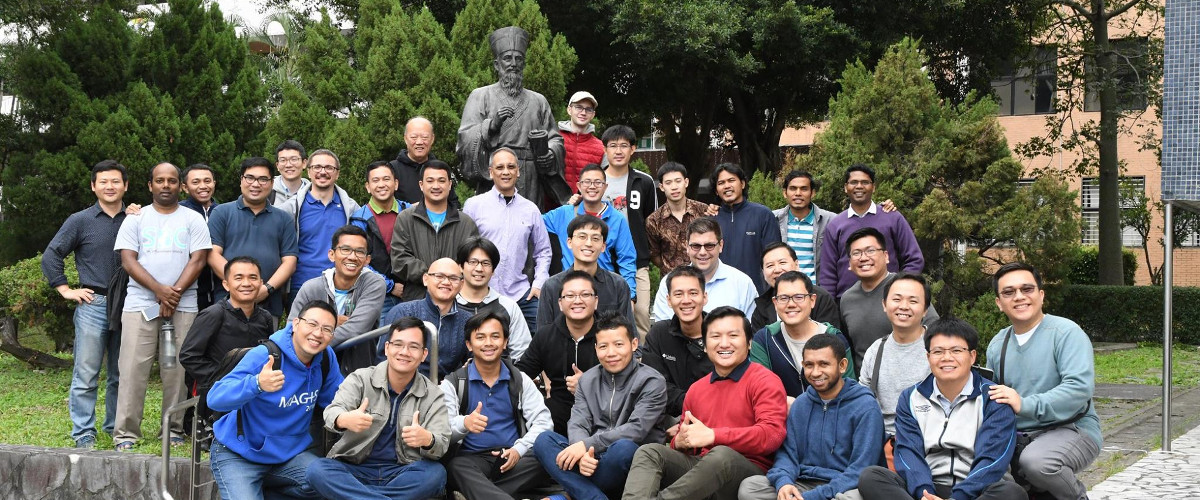
Community-building, immersion, daily Masses, city tour, academic lectures, periods of reflection, food expeditions, museum visits, efficient train rides, Christmas festivities and lasting friendships – these are just some of the tags that can summarise the 10-day Scholastics and Brothers Circle (SBC) workshop in Taiwan from December 15 to 25.
A total of 37 formands of 15 nationalities (six Vietnamese, five Burmese, four Filipinos, four Indonesians, three Koreans, three Australians, two Thais, two Timorese, two Chinese, an Italian, a Singaporean, a Malaysian, an Indian, a Polish, and a Japanese) participated in the workshop that centred on “Indigenous Ministry and the Mission of the Jesuits in China”. Jesuit Conference of Asia Pacific Socius Fr Eric Velandria SJ and Formation Delegate Fr Riyo Mursanto SJ accompanied the participants.
Fr Olivier Lardinois SJ, who combines pastoral work with indigenous peoples and doctoral studies in anthropology, facilitated the meeting. Most of the activities, including residences of the participants, were held in Fu Jen Faculty of Theology of St Robert Bellarmine Community in New Taipei City. Fr David Yen SJ, the Jesuit Delegate to Fu Jen, provided a hands-on tour of the campus and explained the philosophical meanings of the designs and locations of the buildings.
In the morning of December 17, the participants had their team building activities despite the 13°C temperature outside. In the afternoon, at Tien Center at Sacred Heart Parish, Guting, Fr Emmanuel Lim SJ, Delegate for China of the Chinese Provincial, talked about the mission of the Chinese Province. Part of the talk was the introduction to the staff of Magis Center. Chinese Provincial Fr Stephen Chow SJ celebrated the Mass followed by a sumptuous Chinese dinner with the lay and Jesuit community of Sacred Heart. There they met the lively Fr Andres Diaz de Rabago SJ, the oldest member of the Chinese Province at 102 years old! After dinner, Fr Lardinois brought the group to Longshan Temple to witness the faith of many Taiwanese Buddhists. The Temple also serves as refuge for many homeless at night.
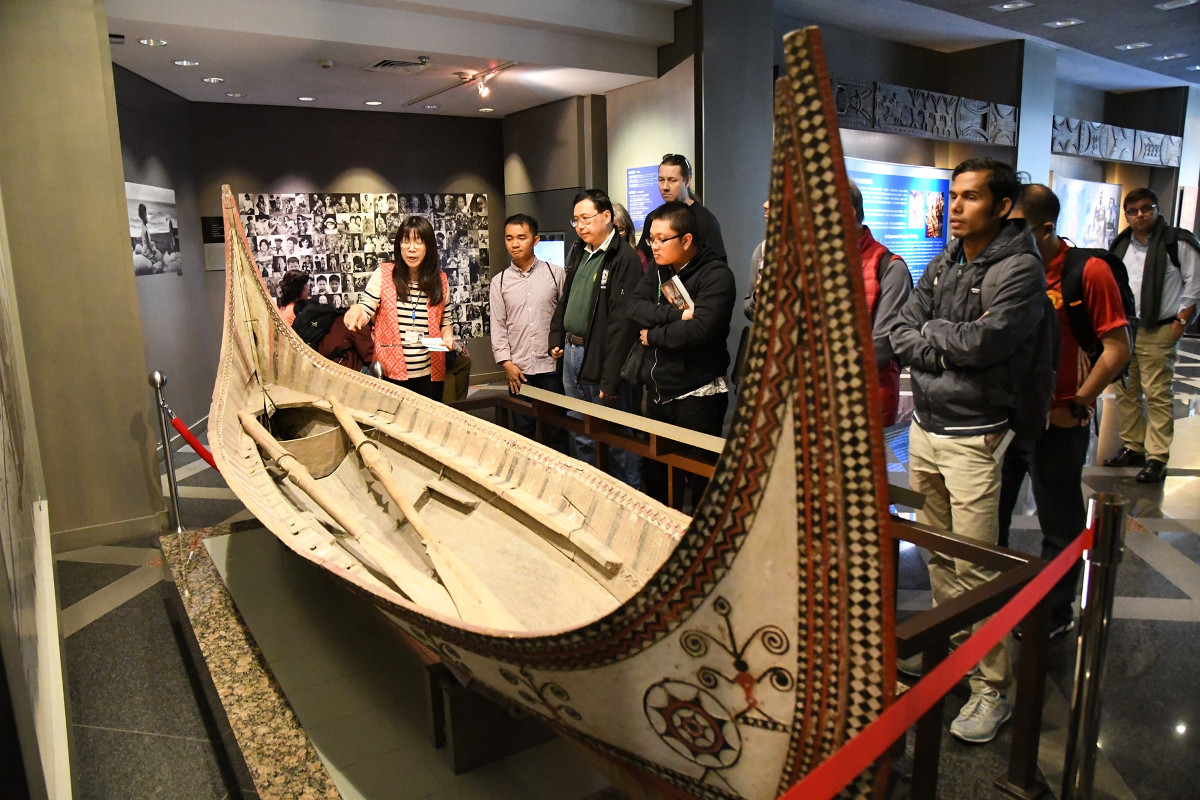
December 19 to 21 were days dedicated to living with indigenous peoples, mostly of the Atayal Tribe of Central Taiwan. A day prior, Fr Lardinois oriented the participants about Taiwan Aborigines and the Jesuit indigenous ministry, and took them to Shung Ye Museum of Formosan Aborigines.
A two-hour bus ride took the participants from Fu Jen University to the Jesuit Parish in Zhudong, Hsinchu Hsien. They were welcomed by very engaging lay persons who shared about the parish’s pastoral services, particularly the intensive catechetical programmes to young and old.
The formands were divided into four groups for their immersion: one group went with Fr Yves Nalet SJ to Shilei, another to Xinguang with Parish Priest Fr Corneille Heynanns SJ, group three to Qunqquan where Fr Barry Martinson SJ was waiting and group four to Nalou with Fr Lardinois. It took three hours of navigating the zigzag road before they reached their mission stations.
The participants gained plenty of memorable experiences from the immersion, such as the meaningful conversations with indigenous peoples and experiencing their warm hospitality, bathing in hot springs in 10°C weather, tasting sautéed and stewed flying squirrels and house-to-house Christmas carolling.
Italian Scholastic Cesare Gabriele Sposetti SJ, shared: “As a ‘westerner’, I never before had the opportunity to meet indigenous cultures. This kind of encounter helped me to have a wider picture of the cultural and human variety of this part of the world.”
On the way back to Taipei, the participants stopped by St Aloysius Technical School at Hsinpu, Hsinchu Hsien. This Jesuit educational institution has produced several quality technocrats in Taiwan. Many were astonished to realise that behind the school’s success are laypersons led by Principal Jerry Jyh-Lung Tang.
On December 22, Fr Lardinois provided a synthesis of the immersion experience by placing his expertise in anthropology side by side the Ignatian paradigm. This was supplemented by the brief sharing of each group of the fruits of their structured reflections and spiritual conversations. Then it was the participants’ turn to present. Each country reported about their respective province’s or region’s effort in serving indigenous peoples. In the evening, the group held a Christmas party.
The remaining days were devoted to excursions around Taipei. The formands made sure not to miss the National Palace Museum to see the paintings of Br Giuseppe Castiglione SJ, imperial painter to Emperors Kangxi, Yongzheng and Qianlong in the mid-18th century.
Although only 10 days, the SBC workshop in Taiwan fortified the formands’ appreciation of the Chinese Jesuit Province and the ministry to the indigenous peoples.
Hear Them Speak
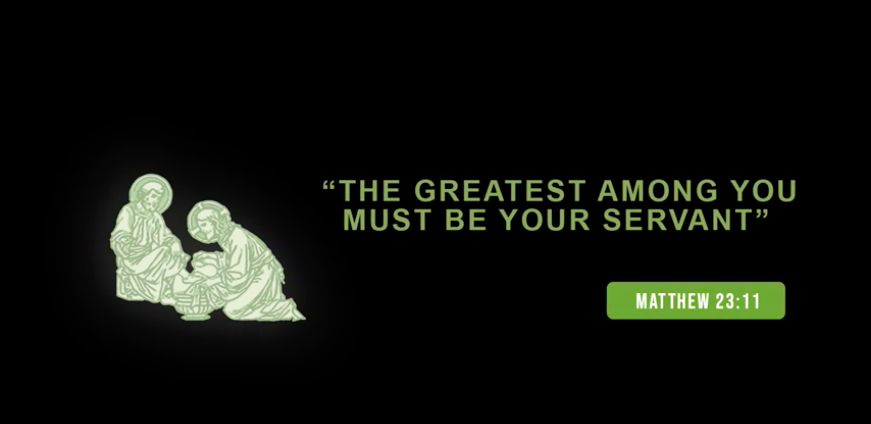
On 27 October, 15 candidates from Arrupe International Residence and Loyola House of Studies will be ordained to the diaconate.
Here they are, sharing in their own words about their consolations, struggles and hopes for the future.

